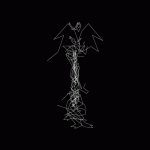
Oneohtrix Point Never Garden of Delete
(Warp)
Over the course of his illustrious career, Daniel Lopatin has continually defaced the rigidly austere standards of electronic music with a nihilistic streak. Curiously enough, the more he frowns upon any kind of structural coherence the more acclaim he receives. This takes a great amount of trust, coming from someone who will purposely play all kinds of mind games that take the form of artful, digital concepts of misdirection. Lopatin’s schizoid-like approach to the album format can be considered both satire and subversion, but the way he compiles and arranges all those textural snippets with such control is dead serious in its commitment.
Garden of Delete is Lopatin’s latest attempt at trying to find a middle ground between creation and annihilation, interconnecting a series of disjointed elements that offer up a reflection on media consumption in the digital era. Many of the shrieking textures that abound stem from references that don’t seem as recognizable at first, capping a series of sounds that bounce around each other and, thus, trigger a sensation of familiarity. Heard that rapping inflection before, except in some grotesque form of chipmunk auto-tune? Or maybe what sounds like a cop show theme song, only that it’s played in what sounds like a Synclavier? All of these may in fact be true, as if you’re barely catching a glimpse of Lopatin’s indistinct memories.
The liberties Lopatin takes in etching Garden of Delete together are commonplace to an extent, seeing as he’s made it his life’s work to construct albums that ruminate in obtuse generalities. Despite the repeatedly creepy nature of his recent efforts, G.o.D is, to a degree, its more sinister in tone, more maddeningly madcap than his usual pursuits. The unwelcome Intro sounds like a warning rather than an invitation, where wheezing, tenebrous voices collide against each other with a ravenous appetite. It leads into the curiously abstruse Ezra, a wordless disarray of jumbled, glitched-out paranoia that veers close to the current conventions found in experimental R&B backed with power ballad cheese guitars. Once you stumble down that deep rabbit hole there’s no way to turn back, so once Sticky Drama ascends and descends with its sampled, top 40 amusements and diaphragm-pushing yowls, the question remains as to whether he’s genuinely trying to take himself seriously.
As much as Lopatin has tried to separate himself from the sterile synth tones of his previous effort R Plus Seven, and even parts of Replica before it, a few of his signature maneuvers trickle about: from the acid-drenched coarseness of Mutual Standard (which plays out like a futuristic obstacle course) to the smoky, multi-timbral sequences of Child of Rage (which wouldn’t sound out of place in some VHS-produced eighties tutorial about the dawn of personal computing), Lopatin continues to relish the future-seeking sonic details that must’ve informed his younger years. Perhaps the more surprising departure is I Bite Through It, a track that attempts to emulate a more abstract form of warbled EDM (as if playing to a crowd of thousands meant he manipulates his audience by constantly slowing down and picking up the tempo with a Simon board game pad.)
Still, Garden of Delete does manage to disturb despite its more frivolous moments; the six and a half minute Freaky Eyes, for instance, unsettles in its horrid, enrapturing quietude a la Christopher Young. But Lopatin changes gears too often, leaving the impression that he’s foolishly trying out different ideas instead of truly investing in conveying a more circular approach. G.o.D ends with No Good, the closest he’s ever gotten to writing a Kanye-like ballad (yes, that Kanye!), as a chipped, heavily-processed voice asserts with some repent, "No God / no good". The sheer tenacity of his uncontrollable output is limitless, playing with all the tools he has at his disposal with an almost godlike control, and just like that…he clicks the delete button.
13 November, 2015 - 06:00 — Juan Edgardo Rodriguez